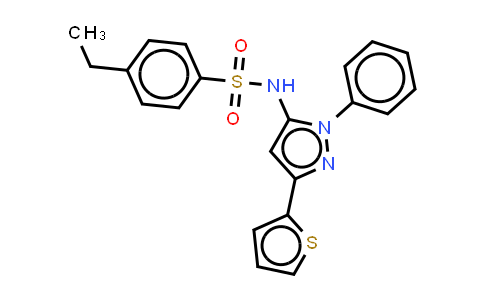
HSF1A NLT 98%
SKU : MC510594
CAS Number : 1196723-93-9
Molecular Formula : C21H19N3O2S2 | Molecular Weight : 409.52
Quote Request| Purity | NLT 98% |
|---|---|
| Storage | at 20ºC 2 years |
* The above information is for reference only.
* If the product has intellectual property rights, a license granted is must or contact us.
| Chemical Name | HSF1A |
|---|---|
| CAS Number | 1196723-93-9 |
| MDL Number | MFCD22580417 |
| Molecular Formula | C21H19N3O2S2 |
| Molecular Weight | 409.52 |
HSF1A is a cell-permeable activator of heat shock transcription factor 1 (HSF1). IC50 & Target: HSF1[1] In Vitro: HSF1A protects cells from stress-induced apoptosis, binds TRiC subunits and inhibits TRiC activity without perturbation of ATP hydrolysis. Genetic inactivation or depletion of the TRiC complex results in human HSF1 activation and HSF1A inhibits the direct interaction between purified TRiC and HSF1 in vitro. Moreover, fluorescence anisotropy experiments using FITC coupled to HSF1A demonstrates that HSF1A-FITC binds to a purified Tcp1 subunit of TRiC with an affinity of approximately 600 nM. This is validated qualitatively via titration of purified Tcp1 into binding reactions containing 500 nM Biotin or HSF1A-Biotin[1]. Quantification by counting the number of cell containing aggregates as a function of the total number of cells reveals that at HSF1A concentrations as low as 2 µM, a reduced number of aggregate-containing cells are observed. The fraction of cells containing aggregates continued to decrease in a dose-dependent manner such that pretreatment with 12 µM HSF1A resulta in ~20% of the cells exhibiting aggregates visible by fluorescence microscopy[2]. In Vivo: HSF1A enhances HSF1 activity, stabilizes HSF1 expression and minimizes Doxorubicin (DOX)-induced cardiac damage. WKY rats are challenged with DOX (accumulated dose: 30 mg/kgw), and DOX combined with HSF1A (100 mg/kgw/day). Supplementation with HSF1A significantly elevates cardiac functions back to the levels of the control group. HSF1A has been shown to stimulate human HSF1 nuclear translocation, elevate protein chaperone expression and ameliorate protein misfolding and cell death in a neurodegenerative disease model. The echocardiographic results show that HSF1A also alleviates DOX-induced failures in cardiac function[3].
Related Products
© Copyright 2015-2024 Hangzhou MolCore BioPharmatech Co.,Ltd. All rights reserved.
